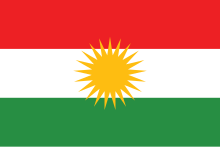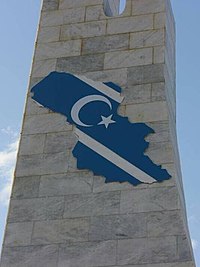Minorities in Iraq
This article has multiple issues. Please help improve it or discuss these issues on the talk page. (Learn how and when to remove these template messages)
|
 |
|---|
|
|
| Constitution |
|
|
Minorities in Iraq include various ethnic and religious groups.
Kurds


The vast majority of Iraqi Kurds are Sunni Muslims, with Shia and Christian minorities.
Under the Kingdom of Iraq, Kurdish leader
When the
After the
Turkmen


The Iraqi Turkmen are the third largest ethnic group in the country, after the Arabs and Kurds.[4][5][6][7] They are a branch of the Turkic peoples and adhere to that heritage and identity,[7] this is because most Iraqi Turkmen/Turkoman are the descendants of the Ottoman soldiers, traders and civil servants who were brought into Iraq from Anatolia during the rule of the Ottoman Empire.[8][9][10] Since the demise of the Ottoman Empire, the Iraqi Turkmen/Turkoman have found themselves increasingly discriminated against from the policies of successive regimes, such as the Kirkuk Massacre of 1923, 1947, 1959, and in 1979 when the Ba'ath Party discriminated against the community.[11] Although the Turks were recognized as a constitutive entity of Iraq (alongside the Arabs and Kurds) in the constitution of 1925, the Iraqi Turkmen/Turkoman were later denied this status.[11]
According to the 1957 Iraqi census the Turkmen/Turkoman had a population of 567,000, accounting for 9% of the total Iraqi population.


The Iraqi Turkmen/Turkoman share close cultural and linguistic ties with
Christians
Christianity has a presence in Iraq dating to the 1st century AD. The Christian community in Iraq is relatively small, and further dwindled due to the Iraq War to just several thousands. Most Christians in Iraq belong traditionally to Syriac Orthodox Church, Chaldean Catholic Church and the Assyrian Church of the East, and are concentrated in small cities in the Nineveh Plains, such as Alqosh, Tel Keppe, Ankawa, and Bartella.
Assyrians

The
The Assyrian minority came under persecution during Saddam Hussein's Ba'athist regime. When Hussein first assumed power, the Assyrian population there numbered 2 million to 2.5 million. Many have fled to neighboring countries such as
Assyrians have traditionally made good soldiers, during the Iran–Iraq War, many were recruited to the armies of both sides.Currently, Assyrians face persecution from Kurds, as
The Assyrian Security force Nineveh Plain Protection Units Currently run the security in many Towns and Villages in the Nineveh Plains
Armenians
The
Other groups
Feylis
Feylis are a distance ethnic Kurdish group who live near the Iraq-Iran border, in
. There are also big Feyli community in Baghdad. In the mid 1970s, Iraq expelled around 40,000 Feyli's who had lived for generations near Baghdad and Khanaqin, alleging that they were Iranian nationals. However, since 2003 many Feyli kurds have returned to Iraq and been granted Iraqi citizenship.Jews
Although historically significant, the Jewish community of Iraq today is very small in number[citation needed]. Almost all Iraqi Jews were transferred to Israel in the early 1950s in Operation Ezra and Nehemiah.
Mandaeans
Mandaeans, also known as
The Iraqi Mandaean community, in the pre-
Marsh Arabs
The Marsh Arabs or Ma'dãn are a group of Arabs who number 125,000 to 150,000 who live in the Mesopotamian Marshes in southern Iraq.
Kaka'is
The Kaka'is are a small Kurdish religious group who located mainly in and around Kirkuk in northern Iraq.
Shabaks
There are about 60,000–400,000 Shabaks in Iraq. They are an ethnic and religious minority, retaining their own distinct Pre Islamic religion. They are an Indo-European (Aryan) people and speak an Indo-European language with elements of Turkish and Arabic infused. The Shabak's origin are not well-known, many notables such as
Despite having their own language and culture unique from other groups, Kurdish authorities have attempted to
Roma (Gypsy)
Iraq's
Ezidis
Today, there are around 650,000 Yezidis in Iraq who live in northern parts of Iraq. All speak Kurdish with the exception of the two villages Bashiqa and Bahzani, located near Mosul.[39] Most Yezidis live in southern Kurdistan (Northern Iraq, the Sheikhan area near Mosul, the Sinjar mountains), southwestern Kurdistan (Northern Syria), northwestern Kurdistan (southeastern Turkey), as well as in Armenia, Georgia, Russia, the Ukraine, the USA, Germany and other countries of Western Europe.[40] the majority consider themselves ethnically Kurdish, although Yazidis are religiously distinct from Iraq's predominantly Sunni Kurdish population. Yezidism has roots in a western Pre-Zoroastrian religion[41][42]
Africans
The
Ajam (Persians)
Baháʼís
Bedouin
Circassians
Assaults on minority Groups since 2003
- In August 2014, Assyrians.
- In total, 40 churches have been bombed since June 26, 2004.
- August 10, 2009: Truck bombs kill at least 28 people in the Shabak village of Khazna, in Nineveh governorate[44]
- June 20, 2009: Truck bomb kills at least 70 people in a Turkmen village near Kirkuk[45]
- Chaldean Catholic Archbishop Paulos Faraj Rahho was kidnapped on February 23, 2008. Three of his companions were also murdered during the kidnapping. His body was found in March, and an Iraqi Al-Qaeda leader, Ahmed Ali Ahmed, known as Abu Omar, was sentenced to death in May for this crime.[46][47]
- January 9, 2008: 2 Assyrian churches bombed in Kirkuk.[citation needed]
- January 6, 2008: 7 Assyrian churches bombed: three churches in Mosul and four in Baghdad.[48]
- August 14, 2007: Bombing of Qahtaniya and Jazeera- killed 796 people and wounded 1,562, targeting the Yazidi minority.
- June 4, 2007: 2 churches attacked, Ragheed Ganni, a priest, and three men were shot dead in church.[49]
- October 2006: Orthodox priest, Boulos Iskander, kidnapped in Mosul and subsequently beheaded, and his arms and legs were cut off.[49][50]
- January 29, 2006: 4 churches bombed.[citation needed]
- January 2005: Syriac Catholic Archbishop of Mosul, Basile Georges Casmoussa, kidnapped on January 17 and released.[51]
- December 7, 2004: 2 churches bombed.[48]
- November 8, 2004: 1 church bombed.[citation needed]
- October 16, 2004: 5 churches bombed.[48]
- September 10 and 11th, 2004: 2 churches bombed.[citation needed]
- August 1, 2004: 5 Assyrian and 1 Armenian churches bombed.[citation needed]
See also
References
- ISBN 978-1-351-18881-4.
- ^ Viviano, Frank. "The Kurds in Control Archived 2007-12-01 at the Wayback Machine." National Geographic, January 2006 pg 26.
- Television New Zealand. Reuters. September 4, 2006. Archived from the originalon September 20, 2011. Retrieved October 25, 2011.
- ISBN 978-0-7391-3380-4,
the Turkmen are Iraq's third-largest ethnic group after the Arabs and Kurds
- ISBN 978-1-61535-637-9,
The Turkic-speaking Turkomans/Turkmen are the third-largest ethnic group in Iraq after the Arabs and the Kurds.
- ^ "Minorities in Iraq Pushed to the brink of existence" (PDF). European Parliamentary Research Service. 2015. pp. 3–4. Retrieved 19 June 2018.
- ^ ISBN 978-1-317-42368-3,
Turkmen, Iraqi citizens of Turkish origin, are the third largest ethnic group in Iraq after Arabs and Kurds, and they are said to number about 3 million of Iraq's 34.7 million citizens according to the Iraqi Ministry of Planning.
- ISBN 1-895896-26-6,
The largest number of Turkmen immigrants followed the army of Sultan Suleiman the Magnificent when he conquered all of Iraq in 1535. Throughout their reign, the Ottomans encouraged the settlement of immigrant Turkmen along the loosely formed boundary that divided Arab and Kurdish settlements in northern Iraq.
- ISBN 978-1-886604-75-9,
There's a strong conflict of opinions regarding the origins of Iraqi Turkmen, however, it is certain that they settled down during the Ottoman rule in the northwest of Mosul, whence they spread to eastern Baghdad. Once there, they became high ranked officers, experts, traders, and executives in residential agglomerations lined up along the vast, fertile plains, and mingled with Kurds, Assyrians, Arabs, and other confessions. With the creation of the new Iraqi state in 1921, Iraqi Turkmen managed to maintain their socioeconomic status.
- ^ a b International Crisis Group (2008), Turkey and the Iraqi Kurds: Conflict or Cooperation?, International Crisis Group, archived from the original on 12 January 2011,
Turkomans are descendents of Ottoman Empire-era soldiers, traders and civil servants... The 1957 census, Iraq's last reliable count before the overthrow of the monarchy in 1958, put the country's population at 6,300,000 and the Turkoman population at 567,000, about 9 per cent...Subsequent censuses, in 1967, 1977, 1987 and 1997, are all considered highly problematic, due to suspicions of regime manipulation.
- ^ ISBN 978-0-7456-3227-8
- ^ Taylor 2004, 28.
- ISBN 0-944029-93-0,
The 1957 Iraqi census — the last in which the Turkmens were permitted to register — counted 567,000 Turkmens
. - ^ Güçlü, Yücel (2007), Who Owns Kirkuk? The Turkoman Case (PDF), Middle East Quarterly, Winter 2007, p. 79,
The last reliable census in Iraqi – and the only one in which participants could declare their mother tongue – was in 1957. It found that Turkomans were the third largest ethnicity in Iraq, after Arabs and Kurds. The Turkomans numbered 567,000 out of a total population of 6,300,000.
- ISBN 978-0-8122-0604-3
- ^ ISBN 978-1-317-67487-0
- ^ Anderson & Stansfield 2009, 56.
- ^ BBC (June 18, 2004). "Who's who in Iraq: Turkmen". Retrieved 2011-11-23.
The predominantly Muslim Turkmen are an ethnic group with close cultural and linguistic ties to Anatolia in Turkey.
- ^ S2CID 56385519
- ISBN 3-447-04293-1
- ^ Boeschoten, Hendrik (1998), "Speakers of Turkic Languages", in Johanson, Lars; Csató, Éva Ágnes (eds.), The Turkic Languages, Routledge, p. 5,
There is a Turkish – or rather Azerbaijanian-speaking part of the population of northern Iraq which is sometimes called "Turkmen", similar to the Yuruk tribes in the Balkans and in Anatolia.
- ^ a b Johanson, Lars (2001), Discoveries on the Turkic Linguistic Map (PDF), Stockholm: Svenska Forskningsinstitutet i Istanbul, pp. 15–16,
The modern Turkish influence was strong until Arabic became the new offıcial language in the 1930s. A certain diglossia Turkish vs. Iraqi Turkic is still observable. Turkish as a prestige language has exerted profound influence on Iraqi Turkic. Thus, the syntax differs sharply from neighboring Irano-Turkic varieties.
- ^ Türkmeneli İşbirliği ve Kültür Vakfı. "Declaration of Principles of the (Iraqi?) Turkman Congress". Archived from the original on 2012-03-08. Retrieved 2011-11-25.
- ^ Nissman, David (5 March 1999), "The Iraqi Turkomans: Who They Are and What They Want", Iraq Report, 2 (9), Radio Free Europe/Radio Liberty
- ISBN 978-1-317-52043-6
- ^ Shanks 2016, 58.
- ^ Guide: Christians in the Middle East". BBC News. 11 October 2011.
- ^ http://www.chaldean.org/news/detail.asp?iData=225&iCat=80&iChannel=2&nChannel=News. Retrieved February 20, 2006.
{{cite web}}: Missing or empty|title=(help)[dead link] - ^ [http:// uk.reuters.com/article/us-mideast-crisis-gharawi-spe- cial-report-idUSKCN0I30Z820141014 http:// uk.reuters.com/article/us-mideast-crisis-gharawi-spe- cial-report-idUSKCN0I30Z820141014].
{{cite web}}: Check|url=value (help); Missing or empty|title=(help) - ^ About 10,000 Armenians live in Iraq
- ISBN 978-90-04-33943-9. p. 5.
- ISBN 9004109099.
- ISBN 9780800604882.
- ^ Who are the Mandaeans Archived March 15, 2007, at the Wayback Machine
- ^ Saddam praises Sabaeans, pledges to build temple
- ^ Minorsky, V. (2012-04-24). "S̲h̲abak". Encyclopaedia of Islam, First Edition (1913-1936).
- ^ "Kurdish Gunmen Open Fire on Demonstrators in North Iraq". AINA. 2005-08-16.
- ISBN 978-0-7556-0120-2.
- ^ "Who are the Yezidis? – Dimitri Pir Bari". Free Yezidi Foundation. Retrieved 2021-05-31.
- ^ Kaczorowski, Karol. "Yezidism and Proto-Indo-Iranian Religion".
{{cite journal}}: Cite journal requires|journal=(help) - OCLC 879288867.
- ^ "Black Iraqis in Basra Face Racism". NPR. 2008-12-03.
- ^ Bomb attacks in Iraq kill dozens, BBC News website
- ^ Iraq bombing kills 70; 182 injured Los Angeles Times website
- ^ Kidnapped Iraqi archbishop dead, BBC World Service, March 13, 2008
- ^ Death penalty over Iraq killing, BBC World Service, May 18, 2008
- ^ a b c Church Bombings in Iraq Since 2004
- ^ a b Harrison, Frances (March 13, 2008). "Christians besieged in Iraq". BBC News. Retrieved May 12, 2010.
- ^ death of Father Boulos Iskander Archived May 20, 2011, at the Wayback Machine
- ^ Basile Georges Casmoussa, Catholic Archbishop, Taken Hostage In Iraq: Diggers Realm
External links
- Still Targeted: Continued Persecution of Iraq's Minorities, Report by Minority Rights Group International
- Iraqi Minorities Council
- Assimilation, Exodus, Eradication: Iraq's minority communities since 2003, Report by Minority Rights Group International
- The Constitution of Iraq: Religious and Ethnic Relations, Study by Minority Rights Group International
